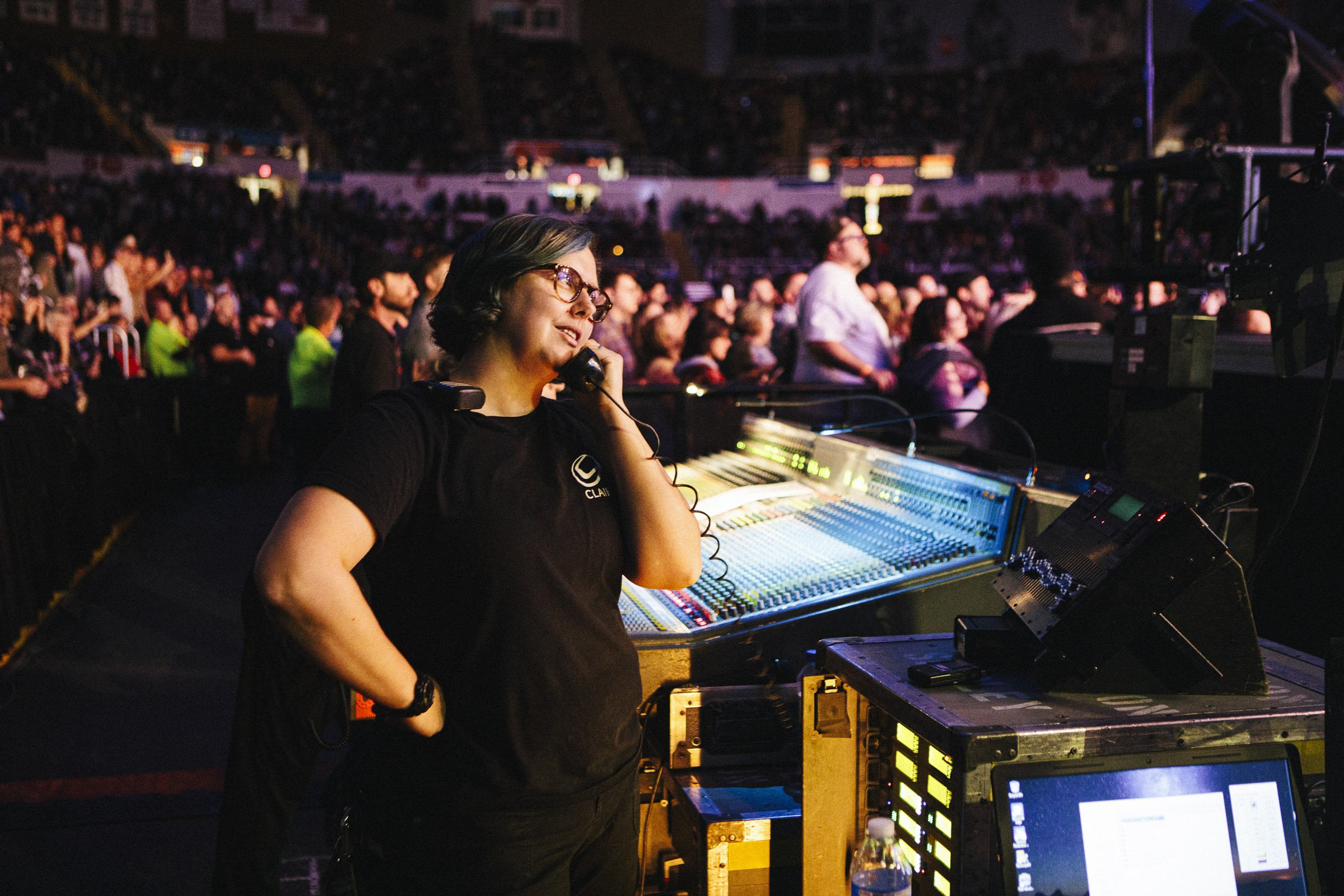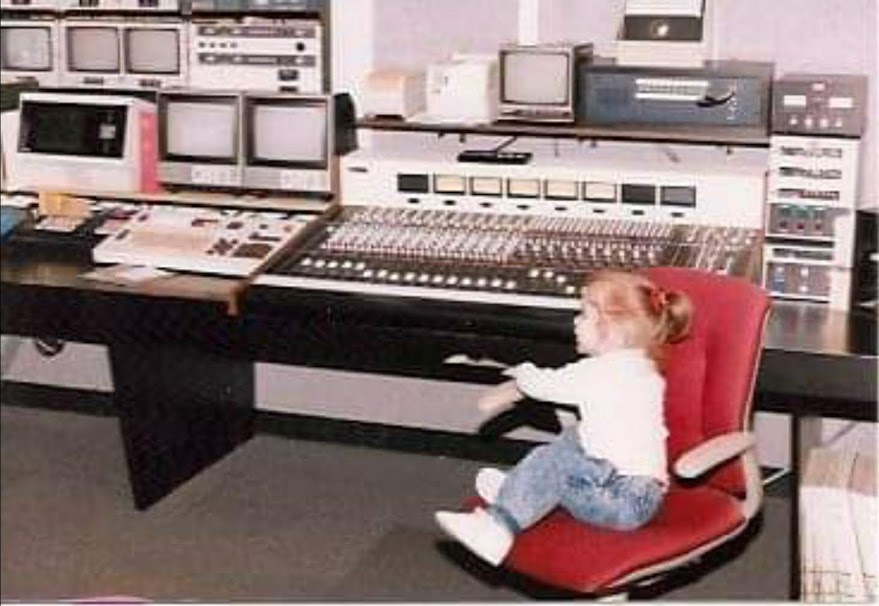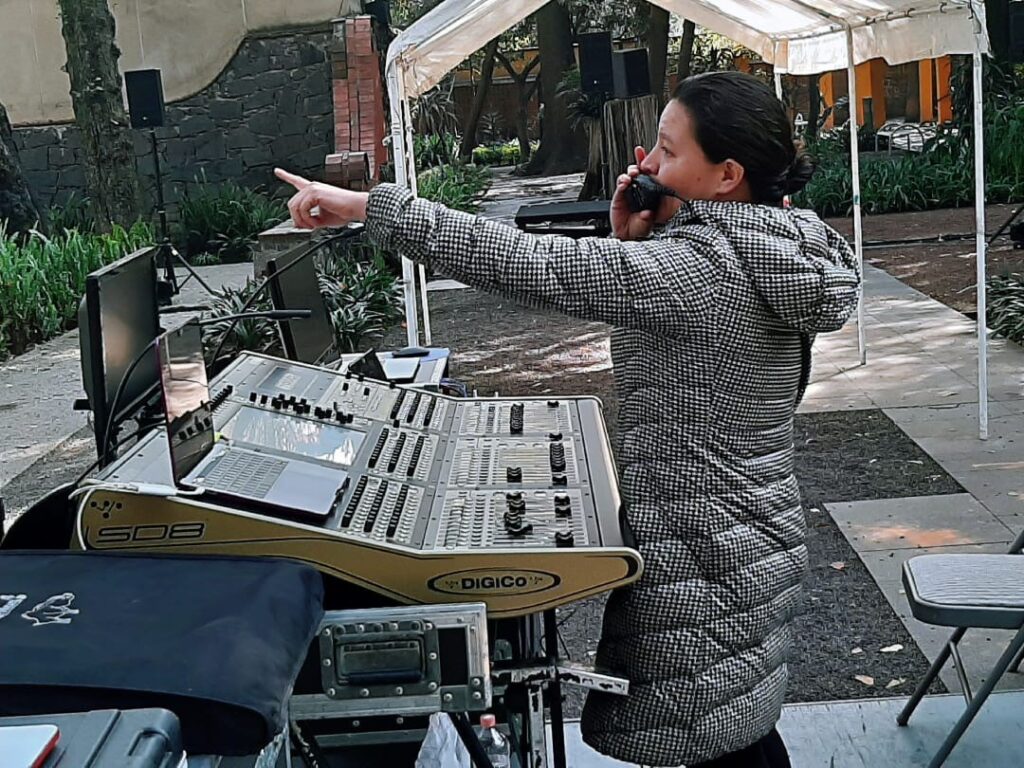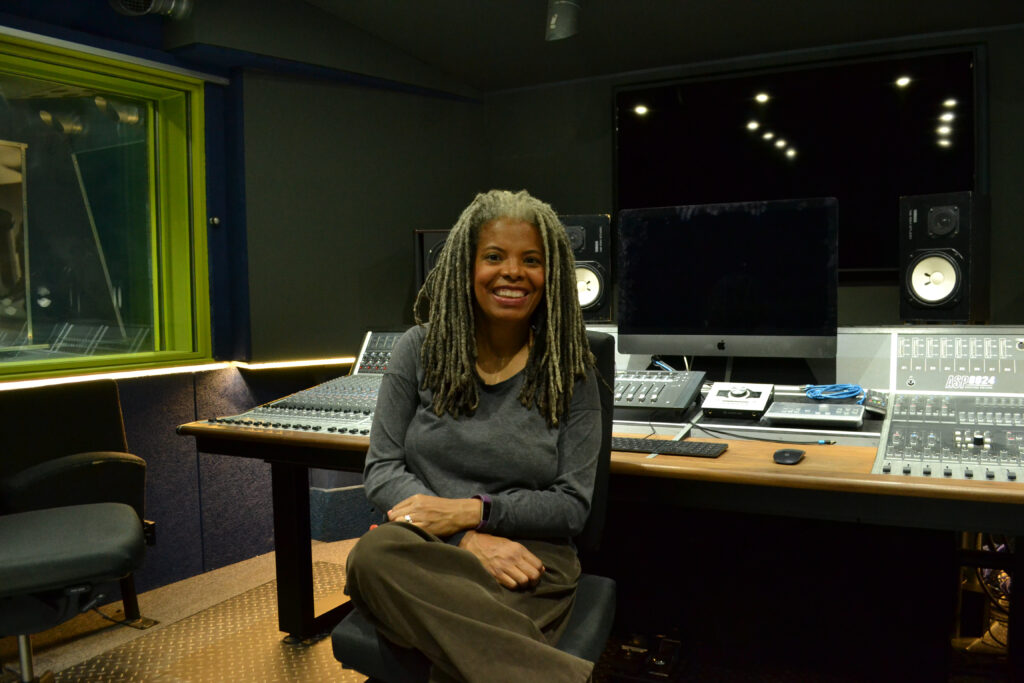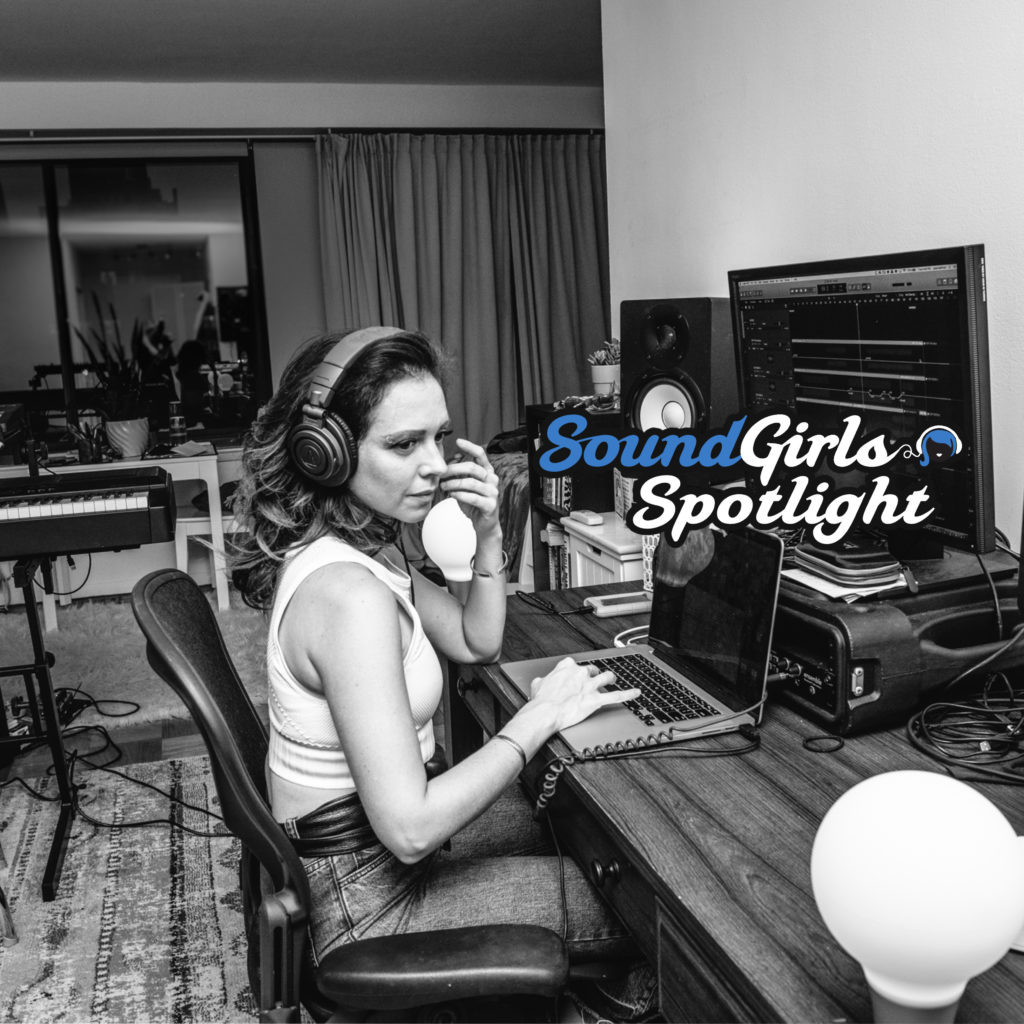Rachael Moser has worked for Clair Global in Nashville for over ten years as a PA Tech, Monitor Systems Tech, RF Tech, Monitor Mixer, and most recently System Engineer/Crew Chief. She has worked in audio for over 15 years and attended Belmont University, graduating from their Audio Engineering Technology program with a BS and minor in business.
Rachael grew up surrounded by music. Her dad was a bass player in a local band and had a full-scale recording studio in his advertising agency. She would spend time in the studio when school was canceled for snow days and other holidays. She would tag along with her parents to concerts and asked to see Tina Turner. Rachael remembers “being in awe of everything I was witnessing; the lights, the dancers, everything. I also remember whining because it was too loud and being too stubborn to put in earplugs. I find that fact to be quite funny given my current profession. Even though I may have complained, it sparked something inside of me that never burnt out. I can still get that feeling of wonder and awe going to a concert.”
Rachael played the oboe and alto saxophone in band throughout middle and high school and described herself as a band nerd. “I was what you would call a self-certified “band nerd.” I was a member of the marching band and was named drum major my senior year. I performed in the backing band for our school’s competitive show choirs, played in the pep band for at-home basketball games, and played in the orchestra for the school musicals. If I wasn’t in class or working on a video project, I was probably in the band room. I enjoyed playing music, but I didn’t LOVE performing. When I found a way to combine my love for music and technology, my passion for playing began to take a backseat.”
Being exposed to both technology and music in school and Rachael developed a love for playing music and working on the student television team. She became an assistant for her video communications teacher, where she could work on editing segments for the daily news and short films that students had put together. Rachael would be introduced to audio while taking a Digital Media Class, where she learned Pro Tools and recording. “It was there that I learned that I could combine my technology background with my love for music and never looked back.”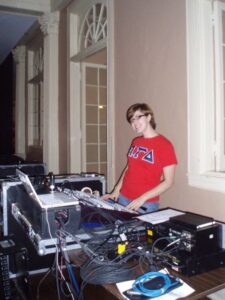
During her junior year in high school, she realized she wanted to pursue an audio career, although, at the time, she was not thinking about live sound. “I wanted to be a producer and own my own independent record label at the same time. I started looking at various colleges and universities that offered music business degrees along with audio programs. I visited a few different colleges, but none felt like the right fit. One day my dad ran into my middle school band director while out shopping. He suggested I check out Belmont University in Nashville. After my first campus visit, I knew it was where I could get a practical, hands-on education while in a small university environment. I would also have access to top-quality internships and job opportunities by being in Nashville, with Music Row just down the road. I knew it was where I needed to be.”
She would enroll at Belmont University in the Music Business program with a production emphasis. It was during her 3rd semester of college that she was introduced to live sound and when she realized that “I had a totally different audio passion. It didn’t come as much of a surprise seeing how much of a connection I felt going to concerts. I switched my major to Audio Engineering Technology but kept a minor in music business. I knew there was value in understanding how this industry and the music business works.”
At Belmont, Rachael was provided a lot of opportunities to work on and off-campus. One of her first jobs in the industry was working for the student-run live sound company, Clear as A Bell. The students were responsible for advancing, prepping, and working all shows they booked under the faculty advisor’s supervision. “It was a great introduction to knowing what it takes to work a show from start to finish.”
As part of the live sound curriculum, they worked on a series of showcases, which were full-scale productions six times a year in the campus arena. It was during one of these showcases that Rachael was introduced to Clair. Rachael would gain experience working alongside the Clair system engineer and monitor tech, flying the PA, ringing out wedges, mixing FOH and monitors. She says this experience solidified her career path in live sound, and she would set a goal to work at Clair and move her way up to system engineer.
Rachael has achieved her goal of becoming a system engineer for Clair Global, and while it was not an easy path, it is one that she says was worth it. She now finds herself thinking, “deeply about where this path takes me next. I know at some point, my husband and I hope to start a family. That will be a big change and potentially impact the next steps in my career. For now, I will continue to grow and educate myself to become an even better system engineer.”
Career Start
I have worked for Clair Global since January 2010. I first started working at Clair in their Nashville shop my last semester at Belmont as part of a student work partnership. I would work two days a week testing cables or assist in whatever department needed help that day. One day it could be the speaker department, getting PA systems tested and ready for a tour. Another day could be in tour prep, packing caddies, and helping the touring staff get their stage and console packages together. During this time, I learned how each department worked and saw how each tour came together. After graduation, I was offered a full-time position in the electronics department, assembling racks. I would spend the next three years working in the electronics shop, specializing in wireless and intercom systems. I moved to Lititz, PA, in 2013 to complete the road staff training program. After training, I moved back to Nashville and have been touring in various roles since, from PA Tech, Monitor Systems Tech, RF Tech, Monitor Mixer, to most recently System Engineer/Crew Chief.
How did your first internships or jobs help build a foundation for where you are now?
In my early years, I learned a lot about myself and who I wanted to be. Starting out, I was so shy and intimidated by everyone else in my classes. It seemed everyone else was further along in their knowledge of audio or had already been working in audio for a few years. I felt behind the curve, and like I would never catch up. I knew the only way to overcome any of that doubt was to put my head down and learn. I took every job and internship as an opportunity to advance further. Not every internship I had was fulfilling from the technical standpoint, but I learned where I wanted to end up and what I wanted to achieve.
When I was first starting out at Clair after college, I was offered the opportunity to run sound for a new worship service starting at a local church. It was an entirely new system that was installed, and I was walking into it about a week before the first service. I was doing it all, setting up the tech cart (the console was a Yamaha LS9 that was on a cart with the lighting console that rolled out of a storage closet and patched into a column in the center of the room), patching the stage, running monitors from front of house, etc. This job taught me a lot about self-sufficiency and time management. I absolutely loved my job running sound at the church and continued to do so for several years until I started touring. I’ll still occasionally fill in if I’m home on a Sunday morning.
What did you learn interning and on your early gigs?
In my early gigs, I was able to develop the confidence I needed to make it in this industry. I remember the very first show I ever had to mix on campus; I was so nervous that I passed out while mixing. Everything was going along fine, but my adrenaline bottomed out, and I may have locked my knees, and I went face-first into the console. I was mortified and wanted nothing more than to run back to my dorm and never come back. But I remembered the few moments right before I left a small dent in that Midas Venice console; I felt so alive. I felt like I was right where I belong. Sure, I could run away and be too embarrassed to mix a show again. Or I could take a beat, remember to breathe, and move on. And move on is what I chose to do. Every show after that, I found myself becoming more confident until I genuinely believed that I belonged.
Did you have a mentor or someone that helped you?
There have been many people who have been big influences throughout my career. However, a few people really stand out as ones who have helped or mentored me along the way.
One of those people would be Jeff Briggette. Jeff was one of the first people to see potential in me as an RF tech when I started building wireless systems. He helped push for me to go on my first broadcast gig to gain real experience. Every time I have worked with him since he has continued to offer knowledge and experience that I continue to use throughout any RF work I do.
Another one who has been a mentor to me is Robert Bull. I have had the privilege to work with and learn from him for several years now. Whether I’m needing guidance through a tough moment in my career or celebrating even the smallest of victories, Bull has been someone who I can go to for advice or help. If I’m struggling with my monitor mixes and have dug myself into a hole I can’t get out of, Bull is the first person who is there to not only help get it sorted but teach along the way.
Career Now
What is a typical day like?
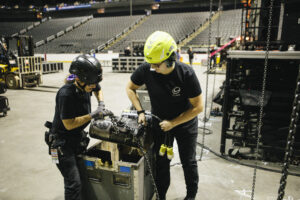 A typical day starts out with me walking into the venue and looking around to see what we can look forward to for the day. I usually have a checklist of questions that I try to get the answers to before load-in begins. I will also determine how will be hanging the PA that day. Once my pre-load in tasks are done, I head off to catering to grab some breakfast.
A typical day starts out with me walking into the venue and looking around to see what we can look forward to for the day. I usually have a checklist of questions that I try to get the answers to before load-in begins. I will also determine how will be hanging the PA that day. Once my pre-load in tasks are done, I head off to catering to grab some breakfast.
The first thing we see off the trucks is our rigging and power package. We will run feeder and get motors prepped to be hung, all before PA starts coming in the door. Once we have PA sorted on the floor, we will see the console and stage packages shortly after.
Once all audio gear is in the building, our stage manager gives us eight stagehands to assist with tipping consoles, hanging PA, and setting the stage. Once the PA is at trim, I head to front of house to assist our front of house engineer with the system’s tuning. Once all fine-tuning is complete, and we verify coverage, the audio team heads off to lunch.
Typically, we will have a band soundcheck each day. During soundcheck, I will walk the room again and verify that we are covering properly and everything we have done to the system is translating well. Once soundcheck is over, it’s time for the opening acts.
Some opening acts carry their own audio packages, while others will utilize a package that we carry with our PA. We will assist the openers to get set up on stage and provide front of house/monitor mixing if requested. Once all soundchecks are done, it’s just about time for doors to open.
With just enough time to take a quick breather and grab some dinner, it’s time to head back out for the start of the show. I sit out front for the remainder of the night, making sure everything is working properly with the system. I will occasionally walk the room to make sure we are still covering well now that the venue is full of people.
Before loadout begins, I’ll get with our PA tech to meet with our stagehands and go over the load-out game plan. I start my loadout at front of house, then move over stage right to begin bringing in PA. Once everything is out and loaded onto the trucks, I shower up, grab some after-show food, and try to get as much sleep as I can.
How do you stay organized and focused?
One of the first things I do in the morning is to make sure I know where our gear is coming in from and where it will end up. I also have a plan with the rest of the crew to stage our cases in an easily accessible area for load out. I always keep a little notebook on me as well to write down any notes or pertinent information that may arise during the day.
What do you enjoy the most about your job?
I was asked recently by someone what is my “why” for doing this job. The best way I could describe it was knowing that I am a part of something that is bigger than myself. I love being able to be a part of a team that brings to life an artist’s vision and help them present it to their fans every night. Being able to look out and know everyone in the crowd is there feeling a connection in their own way to the artist on stage; it brings a feeling that is indescribable. Even after having toured for several years, I still get that feeling when I go to concerts. I love knowing that I can help bring that feeling to other people.
What part of touring do you like best?
I like the challenge of doing the same thing every day but in a completely different place. Sure, the venues all kind of look the same, and after a while, begin to blur together. However, each place has its own uniqueness that you must learn to work with. I feel like that’s what keeps this job from feeling too monotonous. It’s easy to look at touring as doing the same thing day in and day out; load in, do a show, load out. However, every day provides its own set of challenges that keep you on your toes. At the moment, I may be upset at the fact I’m having to do a parking lot party loadout while it’s snowing or that my points took an extra hour because rigging in the building is difficult. I wouldn’t change it for the world.
What do you like least?
Being away from loved ones for so long. It’s easy to feel like I’m missing out on big life events or even the simple joys of normal home life. My husband and I both toured and were even lucky enough to tour together for three years. Before that time, though, he was gone nearly 300 days a year, and I was usually on the road when he was home on a break. It was incredibly tough. Not to mention, with both of us on the road, it made having a dog next to impossible, something we both want very much.
What is your favorite day off activity?
I love finding a day spa in whatever city we are in and booking a self-care treatment for myself. Whether it’s a massage, facial, or pedicure, I enjoy being able to break away from the tour bubble for just a couple of hours and unwind. We work these intense jobs with long hours, constantly on our feet with little sleep. I make sure to take time to relax and decompress.
I also enjoy finding great places to eat. I will remember a city based on places I have eaten on previous tours. Some places have left such an impact that I make a point to return whenever possible. Fun fact, my husband and I planned a vacation to Vancouver based around an oyster bar I found on a day off. I knew from the minute I sat down that I wanted to share it with him, so we booked the trip.
What if any obstacles or barriers have you faced?
I’ve had teachers in the past try to discourage me from pursuing a career in audio because “even though it may seem glamorous, most people don’t make it.” In college, I had fellow students openly discuss how they didn’t understand why women would want to be in this business. I had an internship interviewer ask me, “well, what are we supposed to do if a tour doesn’t want a woman on their crew? How would you feel about that?”. In my current job, while, for the most part, rare, I’ll run across the occasional stagehand who seems to have a major issue with me right from the start. Sometimes they are subtle; the eye rolls when giving directions or refusing to listen, then getting an attitude when my voice gets elevated. Others are more direct, making statements of “I don’t work with women” then trying to play it off as a joke while standing right in front of me (yes, this really happened).
How have you dealt with them?
The best way I’ve found to deal with it is to tune it all out and realize that it’s all just noise. Any person who doubts my abilities and refuses to look beyond my gender is not worth my time or worry. I have chosen to surround myself with incredible people and work for a company that supports and lifts me up rather than tear me down.
The advice you have for other women and young women who wish to enter the field?
Never compare your path to somebody else’s. It’s so easy to get caught up in how much more knowledgeable another person may be or how many other tours that person has done. There may be times where you feel stuck, but use that feeling and forage your own way. Never stop learning and never stop growing.
Must have skills?
Troubleshooting is an absolute must skill for me. Being able to locate and solve problems is key, especially if you are under a time crunch or have a dozen other tasks still on your plate. I also believe that continuing education goes together with being able to troubleshoot problems on the road. Further advances in technology require us as techs to stay up to date on the latest equipment that is being sent out on tours.
Favorite gear?
Whirlwind QBox. It may not be flashy, but it will be a lifesaver when you need it most.
More on Rachael Moser
‘Work smart, not hard’: Getting to know the next generation of pro audio
Rachael Moser on Roadie Free Radio
